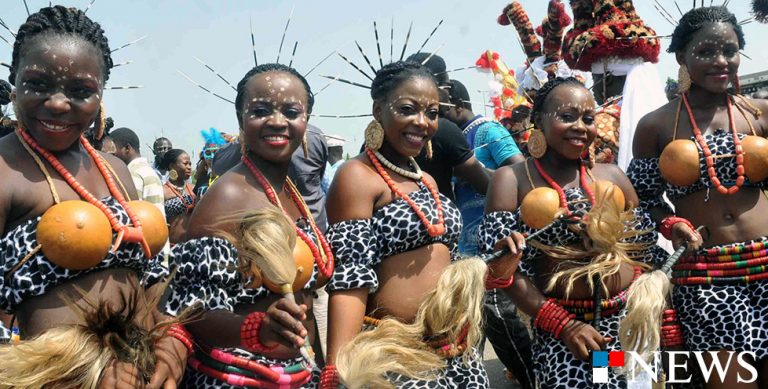
[vc_row][vc_column][vc_column_text] Nigerian People, History And Culture – Famous for her huge population of more than 150 million and with more than 370 ethnics groups, Nigeria has the highest population in African continent.
Nigerian People, History And Culture – Famous for her huge population of more than 150 million and with more than 370 ethnics groups, Nigeria has the highest population in African continent.
The country is made up of three major ethnic groups namely: the Hausa-Fulani, the Yorubas and the Igbos – and they represent around 70 per cent of the population.
Another 10 per cent comprises of several other groups numbering more than 1 million members each, including the Kanuri, Tiv, and Ibibio. More than 300 smaller ethnic groups account for the remaining 20 per cent of the population.[/vc_column_text][/vc_column][/vc_row][vc_row][vc_column][vc_column_text]
The Hausas / Fulanis
The Hausa and Fulani people are located mostly in northern part of Nigeria and cities like Kano, Kaduna, Zaria, Sokoto, Kastina, Jos etc. With a population of over 30 million, they have the largest population in West Africa because of their intermarriages and constant interaction with different peoples.
Their cultural similarities however allowed for significant integration between the two groups, who in modern times are often demarcated as “Hausa-Fulani”, rather than as individuated groups and many Fulani in the region do not distinguish themselves from the Hausa.[/vc_column_text][/vc_column][/vc_row][vc_row][vc_column width=”1/2″][vc_single_image image=”11524″ img_size=”full” onclick=”link_image” css_animation=”right-to-left” title=”Mask Igbo People, Nigeria”][/vc_column][vc_column width=”1/2″][vc_column_text]
The Igbos
Igboland is the home of the Igbo people and it covers most of Southeast Nigeria. This area is divided by the Niger River into two unequal sections – the eastern region (which is the largest) and the midwestern region.
The river, however, has not acted as a barrier to cultural unity; rather it has provided an easy means of communication in an area where many settlements claim different origins.
The Igbo people have historical heritage dated back to the stone age and they are industrious people with vibrant and colourful cultural display.
Also surrounded on all sides by other tribes like the Bini, Warri, Ijaw, Ogoni, Igala, Tiv, Yako and Ibibio.[/vc_column_text][/vc_column][/vc_row][vc_row][vc_column][vc_column_text]
The Yorubas
Yoruba people live mostly in Southwest Nigeria. They have developed a variety of different artistic forms including pottery, weaving, beadwork, metalwork, and mask making. Most artwork is made to honour the gods and ancestors and since there are more than 401 known gods to the Yoruba there is much sculpture and artwork made.[/vc_column_text][/vc_column][/vc_row][vc_row][vc_column][vc_single_image image=”11525″ img_size=”full” onclick=”link_image” css_animation=”top-to-bottom”][vc_column_text]Because of the vastness in the number of gods, the Yoruba have been compared to the ancient Greeks in the amount of gods and in the similarities between the structures of the gods. Certainly one of the three largest ethnic groups in Nigeria and often referred to as a tribe, the Yoruba are known to occupy most of southwestern Nigeria as well as the Republic of Benin in southeastern and central Dahomey.[/vc_column_text][/vc_column][/vc_row][vc_row][vc_column][vc_column_text]
The religious divide
Nigeria is divided into 36 states. In the 13 northern states, the vast majority of people are Muslim. The Hausa have been Muslims for almost a thousand years, having been converted to Islam by Arab traders and merchants from the 10th century.
Extremist groups have grown more popular in the north, mainly because of widespread poverty and frustration over corruption and lack of development.[/vc_column_text][/vc_column][/vc_row][vc_row][vc_column][vc_progress_bar values=”%5B%7B%22label%22%3A%2250%25%20of%20the%20population%20are%20Muslim%22%2C%22value%22%3A%2250%22%2C%22color%22%3A%22bar_green%22%7D%2C%7B%22label%22%3A%22About%2040%25%20are%20Christian%22%2C%22value%22%3A%2240%22%7D%2C%7B%22label%22%3A%22About%2010%25%20practice%20traditional%20African%20religions%20or%20no%20religion%22%2C%22value%22%3A%2210%22%7D%5D”][/vc_column][/vc_row][vc_row][vc_column][vc_column_text]In the southern states, the majority of Nigerians are Christian, while some groups continue to practice indigenous beliefs. Generally, religion is taken very seriously. Most people will attend church on a Sunday and make frequent references to God or Jesus in everyday conversation.
Southern indigenous faiths centre around a belief in spirits and also in a supreme being or creator, known as Olorun/Olodumare in Yoruba culture and Chineke/Chukwu by Igbo people.[/vc_column_text][/vc_column][/vc_row]